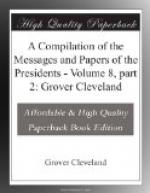no objection. It is wholly prospective, and
touches neither person nor property of any loyal citizen,
in which particulars it is just and proper. The
first and second sections provide for the conviction
and punishment of persons who shall be guilty of
treason and persons who shall “incite, set on
foot, assist, or engage in any rebellion or insurrection
against the authority of the United States or the
laws thereof, or shall give aid and comfort thereto,
or shall engage in or give aid and comfort to any such
existing rebellion or insurrection.”
By fair construction persons within these sections
are not to be punished without regular trials in duly
constituted courts, under the forms and all the substantial
provisions of law and of the Constitution applicable
to their several cases. To this I perceive
no objection, especially as such persons would be within
the general pardoning power and also the special
provision for pardon and amnesty contained in this
act.
It is also provided that the slaves of persons convicted under these sections shall be free. I think there is an unfortunate form of expression rather than a substantial objection in this. It is startling to say that Congress can free a slave within a State, and yet if it were said the ownership of the slave had first been transferred to the nation and that Congress had then liberated him the difficulty would at once vanish. And this is the real case. The traitor against the General Government forfeits his slave at least as justly as he does any other property, and he forfeits both to the Government against which he offends. The Government, so far as there can be ownership, thus owns the forfeited slaves, and the question for Congress in regard to them is, “Shall they be made free or be sold to new masters?” I perceive no objection to Congress deciding in advance that they shall be free. To the high honor of Kentucky, as I am informed, she has been the owner of some slaves by escheat and has sold none, but liberated all. I hope the same is true of some other States. Indeed I do not believe it would be physically possible for the General Government to return persons so circumstanced to actual slavery. I believe there would be physical resistance to it which could neither be turned aside by argument nor driven away by force. In this view I have no objection to this feature of the bill. Another matter involved in these two sections, and running through other parts of the act, will be noticed hereafter.
I perceive no objection to the third and fourth sections.
So far as I wish to notice the fifth and sixth sections, they may be considered together. That the enforcement of these sections would do no injustice to the persons embraced within them is clear. That those who make a causeless war should be compelled to pay the cost of it is too obviously just to be called in question. To give governmental protection to the property of persons who have abandoned




